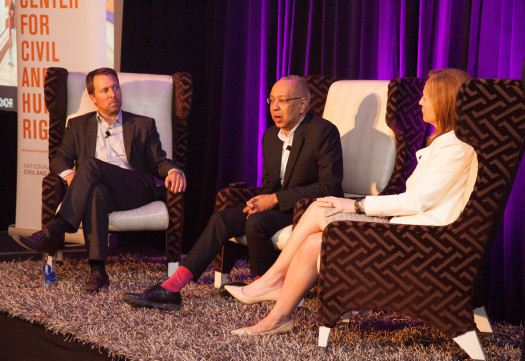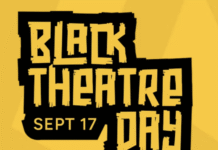
Photo Credit: Tytiani Singleton.
George C. Wolfe is one of American theatre’s most celebrated figures. The double Tony Award-winning African American director, playwright and producer has overseen a total of 14 stage productions on Broadway throughout his career.
Working with numerous actors regardless of their ethnic origin or sexual preference, Wolfe, who himself is openly gay, understands that theatre is a tool that can reflect the complexity of humanity. “Theatre is people in the dark watching people in the light celebrate how wonderful and painful it is to be a human being,” says Wolfe. “When theatre affects you, you lean forward. You can see yourself being embodied.”
The quick-witted storyteller was named the Chief Creative Officer of the National Center for Civil and Human Rights (NCCHR) in Atlanta. Set to open the doors of its new facility this coming Jun. 23, Wolfe’s latest title gives him full liberty to create exhibitions that acknowledge American efforts towards social transformation. The meticulous visionary points out NCCHR’s set of large moving news clippings that journey through the Civil Rights Movement as one of the main attractions.
“I’ve always been in charge of my own journey in many respects,” says Wolfe. “I try to make my job as civically responsible as I possibly can. I try to craft work that’s about empowerment. I want to be committed to a larger idea.”
The tear sheet exhibit segues into an interactive area that commemorates human rights efforts. Wolfe, who also sketched by hand NCCHR’s round exterior, shares that his dream as a child was to own an amusement park. “It’s telling a story I think is powerful and amazing,” says an animated Wolfe. “It’s honoring the world that I come from. It’s honoring the people that were a part of that world.”
Wolfe was joined recently by Alliance Theatre’s Hertz Artistic Director, Susan V. Booth, at Atlanta’s W Hotel Downtown to curate a discussion about theatre and transitioning into his new role. The Frankfort, KY native uses animated hand mannerisms and rapid fire speech to reveal that his orientation with the stage was originally for him to overcome stuttering. “I was theatre obsessed,” says Wolfe, a distinguished member of the President’s Committee on the Arts and the Humanities. “It triggered the confidence inside of me. I live inside the energy of people. Theatre, language and storytelling gave me a sense of my own potency.”
The multiple award winner and grant recipient oversaw hits like Jelly’s Last Jam (Wolfe says was an eight-year process), Caroline, or Change, Lucky Guy, The Normal Heart, Angels in America: Millennium Approaches, A Free Man of Color and Bring in ‘da Noise, Bring in ‘da Funk. Wolfe, a Pomona College alumnus who also studied dramatic writing and musical theatre at NYU, explains his methodology for bringing shows to life. “Read the material, and try to figure out whether or not you can find yourself inside of it,” says Wolfe leaning on a cocktail table. “If you can find yourself, you go on a journey. You learn as much as you possibly can about whatever the world the play is set in. Assemble a team of the smartest people you possibly can find.”
Wolfe, the former producer for Public Theater for 12 years, adds after the discussion, “Broadway is complicated. The ticket prices are very expensive. So every single project you do, you need to work really hard to make sure it’s the most brilliant, dazzling version of what you’re capable of doing,” he says. “It’s all about craft. You’re crafting a world for other people. If people get it, they get it. If they don’t, they don’t.”
When Wolfe rests comfortably on armchair next to Booth, he shares slides show from his stage work. The Broadway veteran reminisces about collaborating with Pulitzer Prize-winning playwrights Tony Kushner and Suzan-Lori Parks. When he was asked to direct Larry Kramer’s The Normal Heart, he was given only two weeks to assemble and direct the cast. The ambitious creator was also set to direct a film project for Grammy-winning artist/producer Kanye West. He spent nine months with the controversial artist but the pair never finalized the details.
Wolfe, who also directed an ensemble cast in the feature film, Lackawanna Blues, remembers Yasiin Bey (Mos Def) seeing Topdog/Underdog approximately 20 times. He encouraged the hip hop artist/actor to audition for the role originally portrayed by Don Cheadle. The move to include a hip hop artist on Broadway was an unprecedented one. “[Mos] spoke about how much he loved the piece,” remembers Wolfe. “[Mos] is a dynamic actor. He shifted the play in a really interesting, dynamic way. I always wanted to bring something to Broadway that didn’t belong there.”
The Renaissance Man continues to leave his imprint with the theatre community. New York’s Landmark Conservatory named Wolfe a Living Landmark. The Stage Directors and Choreographers Foundation (SDCF) even named a fellowship in his honor. If he has to give constructive criticism to other creatives, Wolfe believes, “You have to try and find a balance of offering a person insight to what’s clear and what’s not clear,” he says.
“If you’re dealing with a playwright, discuss their work, and try to give them what you think is successful and what is not. If you’re dealing with a director, go see their play, and see what’s working about the material and what’s not working. That’s very helpful.”
By the end of the evening, Wolfe jokes that he had been talking too much. His full day leading up to the discussion with Booth had been one interview and meeting after another. He’s still welcoming and interactive as he continues to lean over the cocktail table. Reiterating how extremely fortunate he’s been in his career, Wolfe also reiterates what impressions he believes good theatre should leave with the audience.
“You just have to make the work good,” says Wolfe. “I don’t care if it’s a dumb musical or a political thing, just work really hard to do good work. Tell your stories wherever you can tell them, and tell them brilliantly. It’s always nice when you do something that you passionately believe in. That’s its own reward.”
This post was written by Christopher A. Daniel, pop cultural critic and music editor for The Burton Wire. He is also a contributing writer for Urban Lux Magazine and Blues & Soul Magazine. Follow Christopher @Journalistorian on Twitter.
Like The Burton Wire on Facebook. Follow us on Twitter @TheBurtonWire.









[…] voyage begins with a cyclical Civil Rights menagerie on the main level. Conceived by Tony-winning Broadway veteran and CCHR’s Chief Creative Officer George C. Wolfe, despair echoes through the ambiance of pivotal moments like the Freedom Riders, the March on […]
Comments are closed.